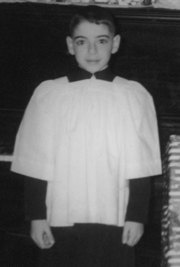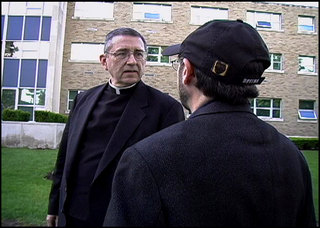By Jennifer Garza
Sacramento Bee
January 15, 2007
http://www.sacbee.com/107/story/107937.html
If Paul Cultrera was going to get the answers he needed to move on with his life, he had to ask the right question. He finally came up with one.
"Do you remember Father Birmingham?"
In 1994, Cultrera placed ads with this seemingly simple question in several Massachusetts newspapers in small towns where the priest had served decades earlier.
 |
| Paul Cultrera served as an altar boy at St. James Parish in Salem, Mass., when he was 13 |
Two days after the ads ran, a letter arrived. The next day, three more. Within 10 days, Cultrera had received 15 letters. The people who responded remembered Birmingham -- and all said they had been sexually abused by him.
The response Cultrera received led him to confront the Boston Archdiocese -- about predatory priests and the church's practice of moving them from parish to parish -- nearly a decade before it became a national scandal.
Now a Sacramento resident and general manager of the Sacramento Natural Foods Co-op in midtown, Cultrera is the subject of a "Frontline" documentary. "The Hand of God," produced by Joe Cultrera, Paul's brother, airs at 10 p.m. Tuesday on Channel 6 (KVIE).
 |
| Filmmaker Joe Cultrera, right, confronts Bishop Richard Lennon, former interim head of the Boston Archdiocese, in a scene from "The Hand of God." Photo by Zingerplatz Pi |
Paul Cultrera, who says the film was shot off and on over the past four years, is a little nervous about going so public with his story.
"People close to me know, but it's not something I talk a lot about," says Cultrera, 57. "This isn't the story of my life; it's something that happened to me." But for years it was more than that.
As shown in the documentary, Cultrera was raised in a close-knit Catholic family in Salem, Mass. The family was so devout that when the local priest asked the women of the parish to donate their wedding rings to improve the church bell, Cultrera's grandmother and other relatives gladly donated their gold bands.
Cultrera met Birmingham at the school where the priest served. The priest invited Cultrera and other boys on outings to the movies or for ice cream, and the rectory was their "clubhouse."
The abuse began one day after confession. Cultrera was 14.
"The shame ... I thought something was wrong with me for this to be happening," says Cultrera. The abuse lasted for several months until one night, on an overnight trip with several other boys, Cultrera angrily pushed the priest away.
Over the years, Cultrera worked a series of jobs, married and divorced -- but never told anyone about the abuse. Then one day, his former wife asked him if he had been abused, and Cultrera confided in her.
Cultrera later told church officials about what happened, but he says they didn't seem surprised. Their response made him suspicious -- and led him to place the ads.
The letters he received astounded him.
"I know why you're asking -- he did the same thing to me."
"It lasted for months."
"I heard he's dead. Thank God."
Cultrera had wanted answers from church officials and had no intention of taking legal action until he met with them again.
"They were so cold," says Cultrera. "It was almost inhuman. ... These were the guys we grew up thinking they were better than us? Examples of Christ on Earth?"
Cultrera eventually settled with the Boston Archdiocese for $60,000 and received therapy. Although he talked to many of the men who responded to his ad, none of them was ready to come forward. "I understood. They hadn't told their wives or their families," says Cultrera. He moved on.
The brothers decided to make the film after church officials closed their parents' church to pay the sexual abuse settlements.
"This church was debt-free, paid for by people like my parents who gave everything, and this was the way they treated them," says Cultrera.
Cultrera, who says he now steps into a Catholic church only for weddings and funerals, is angrier at church officials than at Birmingham.
"They let it go on," he says.
Several church officials appear in the film to have an arrogant attitude, with one calling Joe Cultrera "a sad, pathetic man." The brothers filmed the last Mass at their parents' church, where their 90-year-old father asks the priest about the closure. The priest ignores him.
However, Cultrera wants to make it clear that he knows there are plenty of good priests. Some have responded to the documentary. Bishop Robert J. McManus of the Roman Catholic Diocese of Worcester, Mass., issued a statement saying he hopes the documentary "will help in the process of healing and forgiving," according to the Worcester Telegram & Gazette.
When the media, led by the Boston Globe, broke the sexual abuse story, Cultrera felt vindicated. The other men who had answered his letter formed a group called the Survivors of Father Birmingham. Cultrera is still in contact with them.
These men received more money in their settlements than Cultrera, but he is happy for them. "I was overjoyed that the church was being held accountable."
The Bee's Jennifer Garza can be reached at (916) 321-1133 or jgarza@sacbee.com.
Any original material on these pages is copyright © BishopAccountability.org 2004. Reproduce freely with attribution.